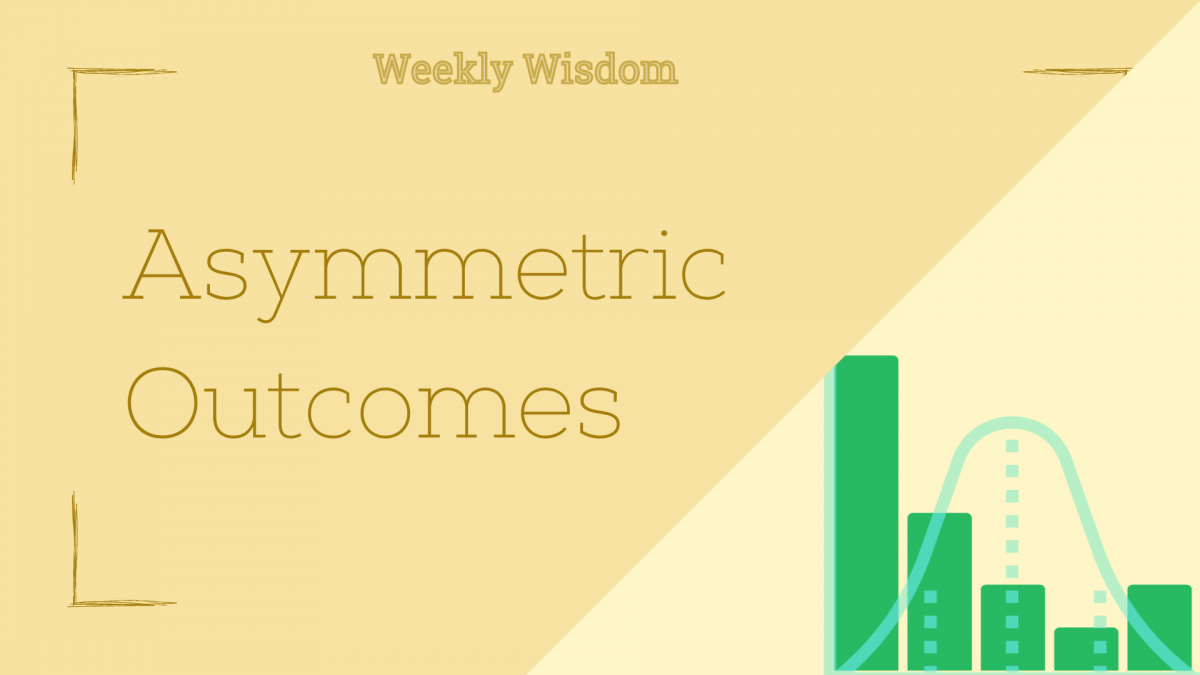Hello Subscribers, New and Old.
Welcome to Weekly Wisdom, your weekly dose of highlights, quotes and notes from my notebook. If you would like to receive this in your inbox, subscribe now. If you want to support, do checkout the links in the Friends of Weekly Wisdom Section.
💡Something I learned
Asymmetric Probabilities and Expectations
The way we approach probability is “wrong”. Sort of. We treat all probabilistic scenarios like coin tosses; the outcomes are assumed to be equal regardless of probability. In the practical world, things are not so simple. The outputs are not symmetric, and neither are probabilities.
Suppose you have a coin that has a probability of 9/10 for heads and 1/10 for tails. You get $1 for each heads and loose $10 on tails. The probabilities are asymmetric and the results as well. You have a higher risk of loss than gain. This is quite apparent in real world markets. Being ‘bearish’ and ‘bullish’ is meaningless and creates a false dichotomy. Markets will go up or down, you need to figure out how much can you expect to lose or gain in either direction.
Extending out asymmetric coin example, suppose you lose a $1 on heads and gain $10 on tails. To say you have a 90% chance of loss tells you nothing about the expectations. The total risk is a expectation leaves you $1 in profit.
This information is not just applicable to market risks. You can apply it to your life as well
📺Something to Watch
Morality via Spreadsheets
I am going to be controversial here; secular moral philosophy usually devolves into utilitarianism. Quantifying esoteric concepts like good, harm, punishment, etc. is a recipe of disaster. This video goes into one such attempt at turning the US criminal justice system more ‘objective’
Friends of Weekly Wisdom
- Refind: The essence of the web, every morning in your inbox. Tens of thousands of busy people start their day with their personalized digest by Refind. Sign up for free and pick your favorite topics and thought leaders. https://refind.com/?utm_source=newsletter&utm_medium=barter&utm_campaign=FU-SmtfFzzhQJDgFEz5eiw
- The Sample: The Sample lets you try the best newsletters based on your interest. With one-click you can subscribe if you like.
🗣Some Quotes and Notes
Unit Economic Meltdown
You have never really paid for an Uber. Uber lost money on every transaction. You were being subsidized by Venture Capital. Well that is over. There is no easy money for startups to fund your lifestyle.
But something beyond rising energy and labor costs led to that startling price tag. With markets falling and interest rates rising, start-ups and money-losing tech companies are changing the way they do business. In a recent letter to employees, Uber’s CEO, Dara Khosrowshahi, said the firm needs to “make sure our unit economics work before we go big.” That’s chief-executive speak for: We gave Derek a nice discount for a while, but the party’s over and now it costs $50 for him to get home.
For the past decade, people like me—youngish, urbanish, professionalish—got a sweetheart deal from Uber, the Uber-for-X clones, and that whole mosaic of urban amenities in travel, delivery, food, and retail that vaguely pretended to be tech companies. Almost each time you or I ordered a pizza or hailed a taxi, the company behind that app lost money. In effect, these start-ups, backed by venture capital, were paying us, the consumers, to buy their products.
It was as if Silicon Valley had made a secret pact to subsidize the lifestyles of urban Millennials. As I pointed out three years ago, if you woke up on a Casper mattress, worked out with a Peloton, Ubered to a WeWork, ordered on DoorDash for lunch, took a Lyft home, and ordered dinner through Postmates only to realize your partner had already started on a Blue Apron meal, your household had, in one day, interacted with eight unprofitable companies that collectively lost about $15 billion in one year.
—Derek Thompson, The End of the Millennial Lifestyle Subsidy
Be Shameless
This short essay is a great read on the burden of shame.
Shame is distinct from guilt because it isn’t about responsibility: it’s about feeling like the very way you are is insufficient and bad and embarrassing
…
Shame makes you terrified of rejection of any kind. There were so many things I was afraid to do because I was afraid to fail at them: I was always waiting for someone to deliver a verdict about my worthlessness. I didn’t want to share anything about myself because it made me feel so horribly exposed. I was so afraid of other people’s judgement. I was brittle, convinced that the world was inherently cruel. I would find myself in spirals of self-loathing where one bad thought could lead to an entire week spent feeling terrible. It was hard for me to improve because improving means accepting where you are and what you lack, and shame stifles your ability to do that.
Ava, on shame
Up and Down The Hill
Writing guru David Perell on the value of leisure and human mortality.
Nobody thinks they’ll get old, but everybody does. The Western World’s fixation on work leads us to evaluate ourselves on achievement rather than on how meaningfully we spend our time. As we move through life, we should swing between the discipline of work and the fullness of leisure. But in both cases, we should remember the scarcity of time and never kill it.
— David Perell, Don’t Kill Time
Thank you for joining me this week. If you know some who might enjoy this, please forward this email to them. See you next week.
Mudassir Chapra

